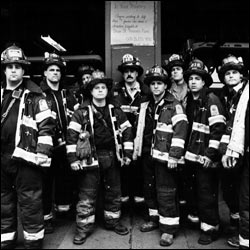
A couple of days after the terrorist attack on the World Trade Center, four therapists appear at the small firehouse on Dean Street in Prospect Heights, volunteering their services to the surviving men of Ladder Company 105 and Engine Company 219. The firefighters shuffle into the kitchen and gather around the oval wooden table – normally the raucous heart of any firehouse, where an unshakable camaraderie grows through arguments over who makes the best green-beans-with-tomatoes and through jokes about who was slowest climbing the stairs at that last tenement fire. Now they sit stunned and exhausted. Most have been digging nonstop since September 11. Seven men from this firehouse are missing.
The counselors invite the firefighters to talk about their feelings. Even in such a raw emotional state, however, spilling their thoughts to strangers is hard. There are several minutes of silence. Haltingly, the words start to come: about the grimness of grabbing a rare solid object from the World Trade Center pile and not knowing whether it’s a chair leg or a human bone. “I found a suit jacket and pants that matched, two shoes, and half a shirt – but no blood, no bone,” Lieutenant Bob Pesce says. “Where the hell’s the guy?” About Frank Palombo, who on the morning of September 11 arrived early for his shift for maybe the fourth time in his 22 years on the job and is now missing. Frank and his wife have ten kids. After a half-hour, it’s the shrinks who are crying on the firefighters’ shoulders.
Later, the head of the counseling service phones to ask if the session was helpful. “Yeah, I guess so,” a firefighter replies, shrugging wearily. “Oh, and the one wearing the pink thong – send her back. Seeing her definitely helped.”
They were numb and heartbroken in those early days. Still are from time to time, like when they’re alone behind the wheel, driving home, and the names and faces of the lost flood their minds. But laughter quickly returned to New York’s firehouses. And while the deaths of 343 firefighters are deserving of solemn reflection, the lives of those men, and the lives of their surviving comrades, are worthy of not just an award but a celebration.
Firefighters are joyous men and women; they love not just their jobs but life itself. It’s clear that even if their lousy paychecks were immediately doubled, New York City’s firefighters would still be working as carpenters and real-estate brokers and plasterers on the side. They’d still be overstuffing their downtime with scuba-diving adventures, charity bicycle marathons, and the coaching of kids’ hockey teams. While the life-saving sacrifices of those who crossed themselves and plunged into the World Trade Center, never to return, have earned our awed respect, it’s the way they lived and the hungry, vibrant way their colleagues continue to live that inspire the city.
As fire companies go, Ladder 105 and Engine 219 are thoroughly unremarkable. Its men will tell you that they were just doing their jobs after the planes hit, that other units lost more people, that the civilians who rescued workers from the burning buildings haven’t gotten nearly the attention they’re due. All true. It is the very ordinariness of these two companies, occupying an ugly brown brick firehouse on a scruffy block in Brooklyn, that symbolizes the heroism that was on display on September 11. Any of New York’s 230 firehouses would have contributed the same selfless courage. All of them did.
One night in late November, the men of Ladder 105 and Engine 219 gather around the dinner table again. They’re biting into some tasty pan-fried haddock when the shrill bleat of a dispatch tone sends them racing to the Bedford Armory homeless shelter. It’s a false alarm. Back at the table before dinner has cooled, firefighter Mike Brady talks about how the grief welled up through his chest as he saluted at Bobby Linnane’s recent memorial service. Someone else mentions plans to attend an upcoming birthday party – the fourth for a Palombo kid since daddy Frank’s death.
But sorrow soon yields to attempts to find something hopeful in the disaster. “For a long time, the attitude in this country has been: If you’re not a CEO or a rock star, ‘Hey, who the hell is this guy?’ ” Charlie Saladis says. “The good that’s come out of this is that the whole country realizes we’re in this together. It’s not so bad to be an ironworker, a cop, a teacher, a firefighter.”
“We hope that feeling sticks around,” Jim Dillon says.
Lieutenant Bill Burke, a 23-year FDNY veteran, initially comes across as a hard fist of a man: ramrod posture, shaven head, bristly gray mustache, salty tongue. But Burke is also a Walt Whitman buff, and he’s nearly poetic trying to draw a lesson from the past months. “People got a real opportunity, at a high cost, to see what’s needed for things to go right,” he says. “You see Jefferson quoted all the time, about eternal vigilance being the price of liberty. Well, now people have gotten a look at us. We’re looking out for people 365 days a year, from the ridiculous problems to the other end of the spectrum, life and death – we’re there in three or four minutes. And this thing happened because other people had a lack of vigilance. The corporations, the politicians – they failed us. This whole country was in a fucking coma. We were the only people ready to fucking deal with it.”
Burke takes a deep breath. The men have heard plenty of his monologues, but now they’re rapt. “People have been very generous to us,” Burke says. “We’re very grateful, and all that helps us keep going – the donations, the support, the awards. People act like they owe us. You know what people really owe us? Their vigilance. From now on.”